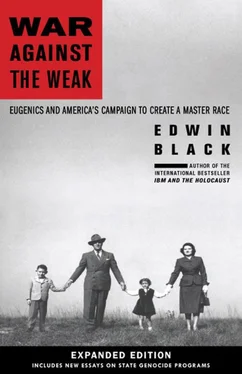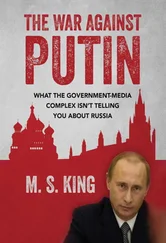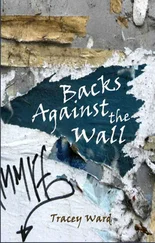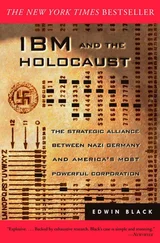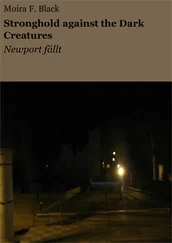Edwin Black - War Against the Weak
Здесь есть возможность читать онлайн «Edwin Black - War Against the Weak» весь текст электронной книги совершенно бесплатно (целиком полную версию без сокращений). В некоторых случаях можно слушать аудио, скачать через торрент в формате fb2 и присутствует краткое содержание. Город: Washington, DC, Год выпуска: 2012, ISBN: 2012, Издательство: Dialog Press, Жанр: История, на английском языке. Описание произведения, (предисловие) а так же отзывы посетителей доступны на портале библиотеки ЛибКат.
- Название:War Against the Weak
- Автор:
- Издательство:Dialog Press
- Жанр:
- Год:2012
- Город:Washington, DC
- ISBN:1-56858-258-7
- Рейтинг книги:3 / 5. Голосов: 2
-
Избранное:Добавить в избранное
- Отзывы:
-
Ваша оценка:
- 60
- 1
- 2
- 3
- 4
- 5
War Against the Weak: краткое содержание, описание и аннотация
Предлагаем к чтению аннотацию, описание, краткое содержание или предисловие (зависит от того, что написал сам автор книги «War Against the Weak»). Если вы не нашли необходимую информацию о книге — напишите в комментариях, мы постараемся отыскать её.
War Against the Weak — читать онлайн бесплатно полную книгу (весь текст) целиком
Ниже представлен текст книги, разбитый по страницам. Система сохранения места последней прочитанной страницы, позволяет с удобством читать онлайн бесплатно книгу «War Against the Weak», без необходимости каждый раз заново искать на чём Вы остановились. Поставьте закладку, и сможете в любой момент перейти на страницу, на которой закончили чтение.
Интервал:
Закладка:
Edwin Black
WAR AGAINST THE WEAK
Eugenics and America’s Campaign to Create a Master Race
Expanded Edition

Illustrations
Title page.Nazi eugenicist Ernst Rüdin, president of the International Federation of Eugenic Organizations and director of the Kaiser Wilhelm Institute for Anthropology, Human Heredity, and Eugenics.
Dedication.Nazi eugenicist Dr. Otmar Freiherr von Verschuer examining the eyes of twins. His assistant, Josef Mengele, continued the experiments at Auschwitz.
Opposite Table of Contents.Nazi eugenicist Dr. Otmar Freiherr von Verschuer examining twins for height.
Part One.First Race Betterment Conference Banquet, held in Battle Creek, Michigan, in 1914.
Part Two.Imprisoned children following eugenic experiments at Auschwitz.
Part Three.Eugenics Record Office files.


Acknowledgments
Where do I begin to express gratitude, when so many people in so many places have lent so many hands to advance the cause of this years-long project? More than fifty researchers in fifteen cities in four countries, assisted by scores of archivists and librarians at more than one hundred institutions, combined to ingather and organize some 50,000 documents, together with hundreds of pages of translation, as well as to review hundreds of books and journals, all to collectively tear away the thickets of mystery surrounding the eugenics movement around the world. I cannot name all who need naming because of space limitations. In many cases, I do not even know them all. Many helped behind the scenes. But if great projects depend upon great efforts by a vast network, then War Against the Weak is greatly indebted indeed.
I must begin by thanking my corps of skilled researchers, mostly volunteers. Because the information needed for War Against the Weak resided in many out-of-the-way archives as well as major repositories, the challenge was to locate the right person in the right place at the right time, from the hilly back country of southern Virginia to Berlin. Recruits came from the Internet, organizational bulletin boards, word of mouth and my personal website, as well as the devoted research team involved with my previous books, IBM and the Holocaust and The Transfer Agreement. Some worked for a few days in a strategic location to extract vital information; others worked for months at a time in archives or my office.
Thanks are due to at least eight people in Germany, including Dennis Riffel, Christina Herkommer and Jakob Kort, who worked tirelessly in Berlin, Munich, Heidelberg, Koblenz and Munster at the archives and libraries of the Max Planck Institutes (successor to the Kaiser Wilhelm Institutes), Bundesarchiv, Heidelberg University, Münster University, the Frei University and many other locations reviewing and summarizing thousands of pages. The laser-like ability of Riffel, Herkommer and their colleagues to identify connections spanning decades between Germans and Americans was indispensable.
In London, Jane Booth, Julie Utley, Diane Utley and several others spent months checking numberless documents, reviewing pamphlets and squinting at microfiche at the Public Record Office, Wellcome Library, University College of London Archives, British Library, Cambridge and other repositories to uncover links across the Atlantic.
In New York, more than a dozen researchers including Max Gross assisted me at the New York Public Library, the archives of New York University, Columbia University, and the Planned Parenthood Foundation. In Virginia, Susan Fleming Cook, Bobby Holt and Aaron Crawford dug through special and restricted library collections, archives, little-known museums, courthouse and institutional records, as well as the files of the ACLU. In California I was assisted by Lorraine Ramsey who worked in Chico, Sacramento and the University of California at Berkeley; Joanne Goldberg at the archives of the Hoover Institution and Stanford University; and others.
No fewer than eight researchers, including Christopher Reynolds and David Keleti, spent long hours at the American Philosophical Society archives in Philadelphia, the country’s most precious eugenic resource. I owe a debt to Ashley and Jodie Hardesty who, among a team of four, scoured the valuable files of Vermont eugenicists, which in many cases were still waiting to be processed. At Truman State University in Kirksville, Missouri, I recruited a cadre of students to scrutinize thousands of pages of documents from the files of Harry Laughlin in the Pickler Memorial Library and its archive, and two of the most helpful were Benjamin Garrett and Courtney Carter. The project was also aided when attorney Charles Bradley volunteered to provide follow-up at the Rockefeller Archives.
Of special importance was Phyllis Bailey of Montreal, who labored at university libraries in Montreal, the Public Records of Vermont, the American Philosophical Society in Philadelphia, and the Rockefeller Archives in Sleepy Hollow, New York. Bailey drove from archive to archive displaying extraordinary research skill and keen intellectual understanding of the injustices she was investigating.
My Washington, D.C., research staff-about a dozen individuals-displayed unflagging tenacity in researching at numerous archives, analyzing and organizing thousands of documents, as well as delivering incomparable research and manuscript detail work. No research project could ask for more. Here I include Kate Hanna, who worked at the National Library of Medicine and the Library of Congress, and, wielding her uncanny memory could recall almost every line of thousands of pages of eugenics journals she reviewed. Once Kate even corrected the date on an archival photograph.
Paul Dwyer displayed a special acumen for locating obscure volumes at numerous libraries, including American University, Catholic University, George Washington University, George Mason University, the University of the District of Columbia and others; he was also among a team of a dozen that pored through record groups at the National Archives. Eve Jones searched files at the National Archives and the Carnegie Institution, and my own considerable archival holdings.
John Corrado, assisted by Eve Jones, led the four-person fact and footnote verification team whose chore it was to cross-examine every fact and bit of fact context and then create the documentation trail, footnote by footnote, folder by folder. Corrado is also an exceptional researcher. Often, as I pounded my keyboard, I would call out an obscure name from decades past; within moments, Corrado was able to report the details. He is a researcher’s researcher.
Corrado, Jones, Hanna and Dwyer were augmented and assisted by Patricia Montesinos, Alexandra Carderelli, Greg Greer, Eric Smith, Erica Ashton and several others. Numerous translators worked arduously and often with little notice; chief among them was Susan Steiner, and Karl Lampl also helped.
War Against the Weak could never have been completed without the exceptional cooperation ofliterally scores of archivists and librarians. Some archivists helped by producing as many as five thousand photocopies from a single institution, often making an exception to their copying regulations, and with special file and fact searches, as well as fellowship.
Читать дальшеИнтервал:
Закладка:
Похожие книги на «War Against the Weak»
Представляем Вашему вниманию похожие книги на «War Against the Weak» списком для выбора. Мы отобрали схожую по названию и смыслу литературу в надежде предоставить читателям больше вариантов отыскать новые, интересные, ещё непрочитанные произведения.
Обсуждение, отзывы о книге «War Against the Weak» и просто собственные мнения читателей. Оставьте ваши комментарии, напишите, что Вы думаете о произведении, его смысле или главных героях. Укажите что конкретно понравилось, а что нет, и почему Вы так считаете.
